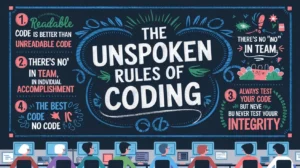The Unspoken Rules of Coding for Both

The Unspoken Rules of Coding for Both Novice and Sage Developers
Coding is not just a skill—it’s a craft, an art form that requires continuous learning, creativity, and an understanding of best practices that go beyond syntax and logic. Whether you’re a novice developer just getting your feet wet or a seasoned coder with years of experience, the unspoken rules of coding are critical to your success and growth. These rules, often passed down through experience and collaboration, are essential for writing efficient, maintainable, and scalable code.
In this article, we’ll explore these unspoken rules that guide developers at all stages, ensuring they produce quality work and continue to evolve in their careers.unspoken rules of coding
1. Understand the Problem Before Writing a Single Line of Code
One of the most common mistakes among novice developers is jumping straight into coding without fully understanding the problem. Experienced developers know that taking the time to thoroughly understand the problem is crucial. This involves reading the requirements, asking clarifying questions, and thinking through possible solutions.
Why It Matters: Coding without a clear understanding often leads to errors, inefficiencies, and increased time spent debugging. By fully grasping the problem, developers can write more effective code that meets the requirements from the start.unspoken rules of coding
2. Start with Pseudocode or Flowcharts
Before diving into actual coding, it’s beneficial to outline your approach using pseudocode or flowcharts. This practice helps in organizing thoughts and planning the logic in a language-agnostic way. Even seasoned developers rely on this step to break down complex problems into manageable pieces.unspoken rules of coding
Why It Matters: Pseudocode and flowcharts allow developers to focus on the logic without getting distracted by syntax. This step often reveals potential issues or optimizations before any actual coding begins.unspoken rules of coding
3. Follow the DRY Principle (Don’t Repeat Yourself)
Repetition in code is a sign of inefficiency and potential bugs. The DRY principle, a cornerstone of good coding practices, emphasizes the importance of reducing repetition. This means abstracting repeated code into functions, methods, or modules that can be reused throughout the codebase.
Why It Matters: By following the DRY principle, developers can create more maintainable and scalable code. It reduces the risk of errors and simplifies future modifications, as changes need to be made in only one place.
4. Code for Readability, Not Just Functionality
Novice developers often focus solely on making the code work, while experienced developers know that readability is just as important. Writing code that others (and your future self) can easily understand is a skill that sets great developers apart. This includes using meaningful variable names, consistent indentation, and adding comments where necessary.
Why It Matters: Readable code is easier to maintain, debug, and extend. It facilitates collaboration within teams and ensures that new developers can quickly get up to speed with the codebase.
5. Master Version Control Systems
Version control systems like Git are essential tools for any developer. They allow you to track changes, collaborate with others, and revert to previous versions of your code if something goes wrong. Both novice and experienced developers should be proficient in using version control systems.
Why It Matters: Version control prevents data loss, makes collaboration seamless, and provides a safety net for experimenting with new features or fixes without risking the integrity of the main codebase.
6. Embrace Test-Driven Development (TDD)
Test-driven development is a methodology where tests are written before the actual code. This practice encourages developers to think about the functionality and edge cases before implementation. While TDD might seem like an extra step, it often leads to more robust and reliable code.
Why It Matters: TDD helps in catching bugs early, ensuring that the code behaves as expected. It also promotes a deeper understanding of the requirements and leads to cleaner, more modular code.
7. Refactor Continuously
Refactoring is the process of restructuring existing code without changing its external behavior. It’s an ongoing practice that both novice and seasoned developers should adopt. Refactoring improves the code structure, making it more efficient, readable, and maintainable.
Why It Matters: Continuous refactoring prevents code from becoming outdated and bloated. It keeps the codebase healthy and easier to work with over time, reducing technical debt and enhancing overall productivity.
8. Comment Wisely
While comments are essential for explaining complex logic or decisions, over-commenting can clutter the code. Both novice and sage developers should learn to strike a balance, ensuring that comments add value without overwhelming the code.
Why It Matters: Well-placed comments can make the difference between code that is understandable and code that is confusing. However, comments should not be a crutch for writing unclear code; the code itself should be as self-explanatory as possible.
9. Understand the Importance of Code Reviews
Code reviews are a critical part of the development process. They involve having other developers review your code before it is merged into the main codebase. This practice helps catch bugs, improve code quality, and share knowledge among team members.
Why It Matters: Code reviews foster collaboration and learning. They ensure that best practices are followed and that the code meets the project’s standards. For novice developers, code reviews are an excellent opportunity to learn from more experienced colleagues.
10. Optimize Only When Necessary
Premature optimization is the bane of many developers. It’s tempting to optimize code for speed or memory usage before it’s even necessary, but this often leads to complicated code that’s hard to maintain. Experienced developers know to focus on writing clear, functional code first and optimize only when performance issues arise.
Why It Matters: By avoiding premature optimization, developers can keep the code simple and maintainable. Optimization should be data-driven, based on profiling and performance metrics, rather than assumptions.
11. Stay Updated with the Latest Trends and Tools
The tech industry evolves rapidly, and what was best practice a few years ago might be outdated today. Both novice and seasoned developers should commit to lifelong learning, staying updated with the latest trends, tools, and programming languages.
Why It Matters: Staying updated ensures that developers remain competitive and can leverage the latest advancements to produce better, more efficient code. It also opens up opportunities for innovation and keeps the work engaging.
12. Practice Consistent Coding Style
Consistency in coding style is crucial, especially in collaborative environments. It involves following a common set of guidelines for naming conventions, indentation, spacing, and other formatting aspects. Many teams enforce coding standards through linters and code formatters.
Why It Matters: A consistent coding style improves readability and makes it easier for multiple developers to work on the same codebase. It reduces friction during code reviews and ensures that the code looks professional.
13. Respect Deadlines but Prioritize Quality
In the fast-paced world of software development, meeting deadlines is important, but it should never come at the cost of code quality. Experienced developers know how to balance speed with quality, delivering functional code on time without cutting corners.
Why It Matters: Prioritizing quality ensures that the code is reliable, maintainable, and free of major bugs. It reduces the likelihood of technical debt, which can slow down development in the long run.
14. Don’t Reinvent the Wheel
With the vast array of libraries, frameworks, and tools available, there’s often no need to build solutions from scratch. Experienced developers know when to leverage existing resources and when it’s necessary to create something new.
Why It Matters: Using existing tools and libraries can save time, reduce errors, and ensure that the code is built on tried-and-tested solutions. It allows developers to focus on solving unique problems rather than reimplementing basic functionality.
15. Know When to Ask for Help
Even the most experienced developers sometimes encounter challenges they can’t solve on their own. Knowing when to ask for help is a sign of strength, not weakness. It’s important to seek advice from peers, mentors, or online communities when stuck.
Why It Matters: Asking for help can save time and lead to better solutions. It fosters a culture of collaboration and continuous learning, where developers can share knowledge and grow together.
16. Document Your Work
Documentation is an often-overlooked aspect of coding, but it’s essential for long-term project success. This includes not just inline comments, but also external documentation such as README files, API docs, and user guides.
Why It Matters: Good documentation makes it easier for others (and yourself) to understand and use your code. It’s especially important in larger projects or when the code will be handed off to another developer.
17. Practice Patience and Persistence
Coding can be challenging, with bugs, errors, and unexpected issues cropping up regularly. Both novice and seasoned developers must cultivate patience and persistence, approaching problems methodically and not getting discouraged by setbacks.
Why It Matters: Patience and persistence are key to problem-solving. They enable developers to work through challenges, find solutions, and continue learning and improving over time.
18. Keep an Eye on Security
Security should never be an afterthought in software development. Both novice and seasoned developers should be aware of common security vulnerabilities and best practices for writing secure code.
Why It Matters: In today’s digital landscape, security is paramount. Writing secure code protects users, data, and the reputation of the developer and the organization. It’s an integral part of delivering quality software.
19. Understand the Full Stack
Even if you specialize in front-end, back-end, or a specific technology, having a basic understanding of the full stack can be incredibly beneficial. This includes knowing how servers work, how databases are managed, and how APIs are structured.












Post Comment